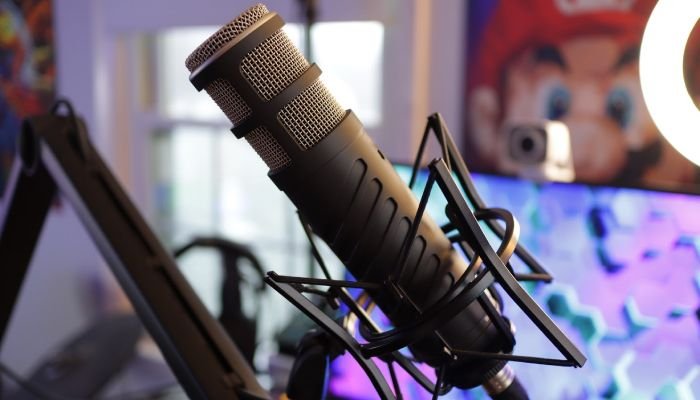

- Rode procaster vs podcaster full#
- Rode procaster vs podcaster pro#
- Rode procaster vs podcaster Pc#
- Rode procaster vs podcaster professional#

It is also a good demo microphone for musicians and songwriters who desire the portability of a USB microphone without sacrificing sound quality.
Rode procaster vs podcaster professional#
Podcasting, YouTube videos, speech recognition software, corporate videos, and any other production application that require a basic yet professional voice over microphone will benefit greatly from the Podcaster. You could record studio-quality vocals wherever you go with a laptop, Podcaster, and some sort of stand. It's a risky move, but it makes sense for capturing the deep, rich vocal sounds that have become synonymous with podcasting. The Podcaster goes head-to-head with higher-priced podcasting microphones like the Shure SM7B by using a 28mm neodymium capsule. Yes, going dynamic is an odd option most USB microphones are condenser, but unless you're recording in a quiet, sound-treated location this is an ideal choice. To satisfy this demand, Rode has developed one of the quickest and easiest ways to capture high-quality speaking performance. A good microphone is obviously vital, and one made expressly for the medium should provide excellent results. Podcasts have grown in popularity, with episodes covering nearly every topic imaginable and including some of the most well-known celebrities. This is a microphone intended squarely for the expanding podcast sector, as the name implies.
Rode procaster vs podcaster Pc#
Rode Podmic Microphone is a dynamic broadcast-quality USB microphone that attaches straight to a USB port on your Mac or PC or even an iPad using the accompanying camera connector kit and a powered hub - obviating the need for an audio interface. As a result, its foray into the world of USB microphones is a natural evolution. The connections are solid for XLR and 3.5mm, my only small qualm is that the usb port is by nature not as solid, but I'm willing to overlook this in lieu of the amazing overall quality of this podcaster microphone dream.Rode is an Australian microphone company that makes good-looking, high-quality condenser microphones for a fraction of the cost of high-end counterparts. It's built very well, with a metal yoke for mounting and sturdy knobs to tighten the tilt of the microphone. There's a silver option, but I got the sleek black mic option, and I feel like a total bad ass on camera using this microphone. And, if you livestream your recordings, then it definitely matters. You wouldn't think that the way a microphone looks would matter, but it does, especially to podcasters. The slider is right on the mic, so you can adjust it right in front of your face. It's a 3.5mm stereo (aux) jack that allows you to route your audio via USB from your computer into your headphones. What's super cool is the built-in monitoring feature, with a touch slider to control monitoring volume. I'd call the MV7 broadcast quality, for sure.ģ) Built-in audio monitoring and levels control
Rode procaster vs podcaster full#
The vocals are nice and full, very full on the low end, and the mic does a great job of isolating vocals and rejecting side and rear noise. I bought the Rode Podmic because it was made for podcasters, but then the MV7 came out and I won't miss it. A little late in the game, but better late than never. But, Shure really stepped up their game creating a mic geared toward podcasters. Shure microphones are already known for high quality vocal recording, with the SM58 being a workhorse vocal mic for live situations, and the SM7b as the "holy grail" of broadcast mics. This happens when people change their show format, or decide to add additional guests or hosts. So you're not having to buy another microphone. If you decide later on that you want to use a digital recorder like the Zoom H4n or Zoom H6, then your MV7 is still compatible via XLR. The USB option means the MV7 contains a pre-amp inside the microphone housing and doesn't require additional equipment to run it into the computer.

This will save you money not having to buy a mixer and a microphone, but just the microphone. If you're just starting your podcast and are looking for a mic, the MV7 is a great option because it offers you a way to plug & play right out of the box if you're recording to your laptop.
Rode procaster vs podcaster pro#
I use the MV7 at my desk on a boom arm connected to my Macbook Pro via USB, but then I run it down to my studio and plug it in via XLR into my Zoom L12 mixer. This is important because it makes it versatile for application. Most microphones are either USB or XLR, but the Shure MV7 is BOTH.

Over the course of my career, I've used a slue of microphones:īut recently I purchased the newly released Shure MV7 Dynamic XLR/USB combo microphone, and IT'S THE BEST. I've found my favorite podcasting microphone, you guys! I began podcasting back in 2012, took a hiatus, and started again in 2016.


 0 kommentar(er)
0 kommentar(er)
